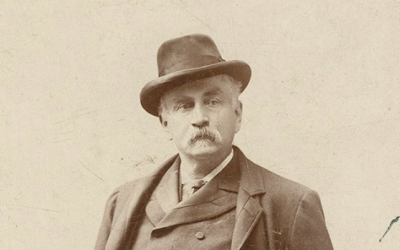Val Kuska, an agricultural agent for the Chicago, Burlington, and Quincy Railroad, was a notable figure in the history of Nebraska agriculture. He devoted his entire efforts from boyhood to retirement from the Burlington in 1957 to the promotion of better agricultural methods.
Born near Ohiowa of Czech immigrant parents in 1887, he attended school at Milligan and was graduated from the School of Agriculture at the University of Nebraska. Experience and knowledge gained from his management of farms and ranches in parts of western Nebraska, Wyoming, and Colorado, and his studies of farming methods while traveling in Europe, qualified Kuska for the position of farm demonstrator in Madison County in 1914. County agents later replaced farm demonstrators.
After service in World War I, Kuska served as a colonizer for a Denver-based land company and later for the Burlington Railroad. He helped locate settlers on land owned by the railroad in Colorado and Wyoming. He was also the railroad’s agricultural development agent, participating actively in the Burlington’s many educational and development campaigns. He usually accompanied the “special trains” which carried ideas on better farming throughout the Burlington’s territory. As a colonizer and an expert on agriculture, Kuska became one of the best-known men in the Great Plains.
Kuska promoted irrigation and reclamation projects as well as methods to improve crop and livestock breeding. Believing that irrigation would bring stability to agriculture, he supported projects such as Tri-County and the Republican River irrigation projects. The Burlington encouraged agricultural development not only to sell land, but also because it would provide more business for the railroad.
Kuska promoted the County Agricultural Extension Service and 4-H work and was instrumental in getting state and county support for these projects. He retired in 1957 and was named to the Nebraska Hall of Agricultural Achievement in 1961. He died in Lincoln on May 21, 1972.



